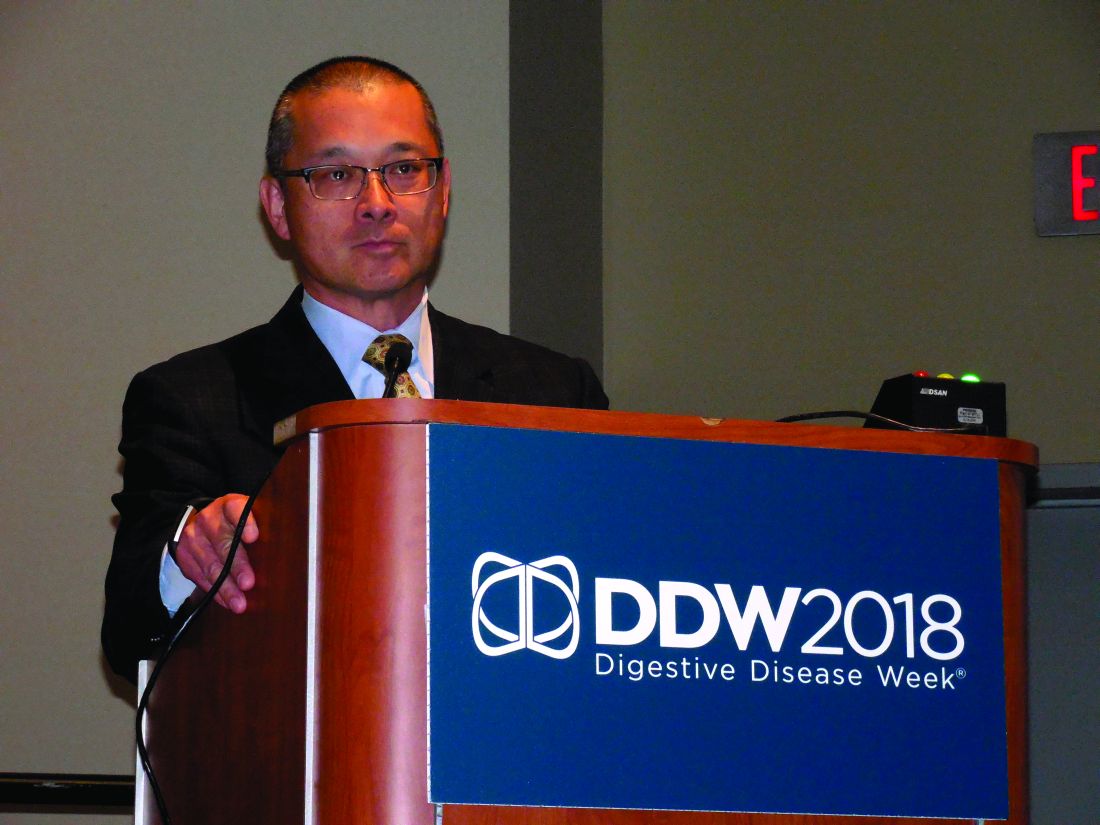User login
WASHINGTON –
These data combined with results from an already reported additional phase 3 trial and a phase 2 study will go to the Food and Drug Administration later in 2018 in an application for marketing approval for tenapanor, William D. Chey, MD, said at the annual Digestive Disease Week.®
“Tenapanor may represent a novel, effective treatment option” for patients with constipation-predominant irritable bowel syndrome (IBS-C), said Dr. Chey, a professor of medicine and director of the GI Physiology Laboratory at the University of Michigan in Ann Arbor.
The study results met the trial’s primary endpoint, the percentage of patients with a combined response consisting of at least a 30% drop from baseline in reported abdominal pain and an increase of at least one complete spontaneous bowel movement (CSBM) per week for 6 of the first 12 weeks of treatment. This combined response occurred in 37% of patients treated with tenapanor at a dosage of 50 mg orally b.i.d., compared with a 24% rate among the placebo-control patients, a statistically significant difference, Dr. Chey reported.
The most common adverse effect seen in the tenapanor-treated patients was diarrhea, which occurred in 16% of the drug-treated patients and in 4% of controls. “I think diarrhea is an expected adverse effect,” Dr. Chey said. Overall, treatment-related adverse effects occurred in 23% of tenapanor-treated patients and in 9% of controls, serious adverse effects occurred in 4% of patients on tenapanor and in 3% of controls, and adverse effects leading to treatment discontinuation occurred in 8% on tenapanor and in 1% of controls. Aside from diarrhea, the other most common adverse effects linked with tenapanor treatment were abdominal distension, in 3%, and flatulence, also in 3%.
Tenapanor is an inhibitor of sodium/hydrogen exchanger isoform 3, the predominant intestinal sodium transporter. Through this inhibition tenapanor reduces sodium uptake in the gut, causing increased intestinal fluid volume and shorter transit time and thereby softening stool consistency and increasing bowel movement frequency. Dr. Chey and his colleagues previously reported results from a phase 2 study of tenapanor (Am J Gastroenterol. 2017 Feb;112[2]:763-74), and from a phase 3 study with 606 patients reported at a meeting in late 2017. Results from these two studies were similar to those from the new study.
The current study, A 26-Week Study to Evaluate the Efficacy and Safety of Tenapanor in IBS-C (T3MPO-2) enrolled 593 patients at 114 U.S. centers. Enrolled patients met the Rome III criteria for IBS-C and had an average CSMB frequency of less than 3/week. The researchers treated and followed patients for 26 weeks, although the primary endpoint occurred after 12 weeks on treatment, and 481 of the enrolled patients remained in the study through 26 weeks. At baseline, patients had an average of 0.12 CSBM/week and an average abdominal pain score of 6.26, indicative of moderate to severe abdominal pain. These characteristics identified the enrolled patients as being “on the more severe spectrum of what we see in clinical practice,” Dr. Chey noted.
Secondary endpoints included the combined endpoint with the target rate of CSBM achieved in at least 9 of the first 12 weeks, 18% on the active drug and 5% on placebo, and in at least 13 of the 26 weeks on treatment, 36% on tenapanor and 24% on placebo. After 26 weeks on treatment, 55% of patients on tenapanor rated themselves as quite satisfied or very satisfied with their treatment, compared with 33% of the placebo-control patients.
T3MPO-2 was funded by Ardelyx, the company developing tenapanor. Dr. Chey has been a consultant to and has received research funding from Ardelyx and from several other companies. A coauthor on the study was an Ardelyx employee.
mzoler@mdedge.com
On Twitter @mitchelzoler
WASHINGTON –
These data combined with results from an already reported additional phase 3 trial and a phase 2 study will go to the Food and Drug Administration later in 2018 in an application for marketing approval for tenapanor, William D. Chey, MD, said at the annual Digestive Disease Week.®
“Tenapanor may represent a novel, effective treatment option” for patients with constipation-predominant irritable bowel syndrome (IBS-C), said Dr. Chey, a professor of medicine and director of the GI Physiology Laboratory at the University of Michigan in Ann Arbor.
The study results met the trial’s primary endpoint, the percentage of patients with a combined response consisting of at least a 30% drop from baseline in reported abdominal pain and an increase of at least one complete spontaneous bowel movement (CSBM) per week for 6 of the first 12 weeks of treatment. This combined response occurred in 37% of patients treated with tenapanor at a dosage of 50 mg orally b.i.d., compared with a 24% rate among the placebo-control patients, a statistically significant difference, Dr. Chey reported.
The most common adverse effect seen in the tenapanor-treated patients was diarrhea, which occurred in 16% of the drug-treated patients and in 4% of controls. “I think diarrhea is an expected adverse effect,” Dr. Chey said. Overall, treatment-related adverse effects occurred in 23% of tenapanor-treated patients and in 9% of controls, serious adverse effects occurred in 4% of patients on tenapanor and in 3% of controls, and adverse effects leading to treatment discontinuation occurred in 8% on tenapanor and in 1% of controls. Aside from diarrhea, the other most common adverse effects linked with tenapanor treatment were abdominal distension, in 3%, and flatulence, also in 3%.
Tenapanor is an inhibitor of sodium/hydrogen exchanger isoform 3, the predominant intestinal sodium transporter. Through this inhibition tenapanor reduces sodium uptake in the gut, causing increased intestinal fluid volume and shorter transit time and thereby softening stool consistency and increasing bowel movement frequency. Dr. Chey and his colleagues previously reported results from a phase 2 study of tenapanor (Am J Gastroenterol. 2017 Feb;112[2]:763-74), and from a phase 3 study with 606 patients reported at a meeting in late 2017. Results from these two studies were similar to those from the new study.
The current study, A 26-Week Study to Evaluate the Efficacy and Safety of Tenapanor in IBS-C (T3MPO-2) enrolled 593 patients at 114 U.S. centers. Enrolled patients met the Rome III criteria for IBS-C and had an average CSMB frequency of less than 3/week. The researchers treated and followed patients for 26 weeks, although the primary endpoint occurred after 12 weeks on treatment, and 481 of the enrolled patients remained in the study through 26 weeks. At baseline, patients had an average of 0.12 CSBM/week and an average abdominal pain score of 6.26, indicative of moderate to severe abdominal pain. These characteristics identified the enrolled patients as being “on the more severe spectrum of what we see in clinical practice,” Dr. Chey noted.
Secondary endpoints included the combined endpoint with the target rate of CSBM achieved in at least 9 of the first 12 weeks, 18% on the active drug and 5% on placebo, and in at least 13 of the 26 weeks on treatment, 36% on tenapanor and 24% on placebo. After 26 weeks on treatment, 55% of patients on tenapanor rated themselves as quite satisfied or very satisfied with their treatment, compared with 33% of the placebo-control patients.
T3MPO-2 was funded by Ardelyx, the company developing tenapanor. Dr. Chey has been a consultant to and has received research funding from Ardelyx and from several other companies. A coauthor on the study was an Ardelyx employee.
mzoler@mdedge.com
On Twitter @mitchelzoler
WASHINGTON –
These data combined with results from an already reported additional phase 3 trial and a phase 2 study will go to the Food and Drug Administration later in 2018 in an application for marketing approval for tenapanor, William D. Chey, MD, said at the annual Digestive Disease Week.®
“Tenapanor may represent a novel, effective treatment option” for patients with constipation-predominant irritable bowel syndrome (IBS-C), said Dr. Chey, a professor of medicine and director of the GI Physiology Laboratory at the University of Michigan in Ann Arbor.
The study results met the trial’s primary endpoint, the percentage of patients with a combined response consisting of at least a 30% drop from baseline in reported abdominal pain and an increase of at least one complete spontaneous bowel movement (CSBM) per week for 6 of the first 12 weeks of treatment. This combined response occurred in 37% of patients treated with tenapanor at a dosage of 50 mg orally b.i.d., compared with a 24% rate among the placebo-control patients, a statistically significant difference, Dr. Chey reported.
The most common adverse effect seen in the tenapanor-treated patients was diarrhea, which occurred in 16% of the drug-treated patients and in 4% of controls. “I think diarrhea is an expected adverse effect,” Dr. Chey said. Overall, treatment-related adverse effects occurred in 23% of tenapanor-treated patients and in 9% of controls, serious adverse effects occurred in 4% of patients on tenapanor and in 3% of controls, and adverse effects leading to treatment discontinuation occurred in 8% on tenapanor and in 1% of controls. Aside from diarrhea, the other most common adverse effects linked with tenapanor treatment were abdominal distension, in 3%, and flatulence, also in 3%.
Tenapanor is an inhibitor of sodium/hydrogen exchanger isoform 3, the predominant intestinal sodium transporter. Through this inhibition tenapanor reduces sodium uptake in the gut, causing increased intestinal fluid volume and shorter transit time and thereby softening stool consistency and increasing bowel movement frequency. Dr. Chey and his colleagues previously reported results from a phase 2 study of tenapanor (Am J Gastroenterol. 2017 Feb;112[2]:763-74), and from a phase 3 study with 606 patients reported at a meeting in late 2017. Results from these two studies were similar to those from the new study.
The current study, A 26-Week Study to Evaluate the Efficacy and Safety of Tenapanor in IBS-C (T3MPO-2) enrolled 593 patients at 114 U.S. centers. Enrolled patients met the Rome III criteria for IBS-C and had an average CSMB frequency of less than 3/week. The researchers treated and followed patients for 26 weeks, although the primary endpoint occurred after 12 weeks on treatment, and 481 of the enrolled patients remained in the study through 26 weeks. At baseline, patients had an average of 0.12 CSBM/week and an average abdominal pain score of 6.26, indicative of moderate to severe abdominal pain. These characteristics identified the enrolled patients as being “on the more severe spectrum of what we see in clinical practice,” Dr. Chey noted.
Secondary endpoints included the combined endpoint with the target rate of CSBM achieved in at least 9 of the first 12 weeks, 18% on the active drug and 5% on placebo, and in at least 13 of the 26 weeks on treatment, 36% on tenapanor and 24% on placebo. After 26 weeks on treatment, 55% of patients on tenapanor rated themselves as quite satisfied or very satisfied with their treatment, compared with 33% of the placebo-control patients.
T3MPO-2 was funded by Ardelyx, the company developing tenapanor. Dr. Chey has been a consultant to and has received research funding from Ardelyx and from several other companies. A coauthor on the study was an Ardelyx employee.
mzoler@mdedge.com
On Twitter @mitchelzoler
REPORTING FROM DDW 2018
Key clinical point: New drug shows safety and efficacy for irritable bowel syndrome.
Major finding: The combined primary endpoint occurred in 37% of tenapanor-treated patients and in 24% of patients on placebo.
Study details: T3MPO-2, a multicenter U.S. trial with 593 patients.
Disclosures: T3MPO-2 was funded by Ardelyx, the company developing tenapanor. Dr. Chey has been a consultant to and has received research funding from Ardelyx and from several other companies. A coauthor on the study was an Ardelyx employee.

